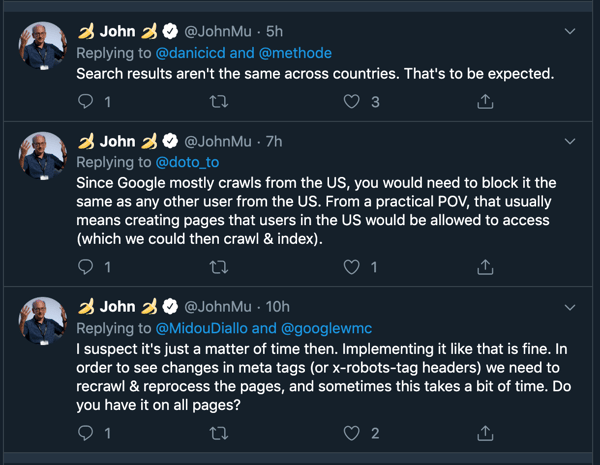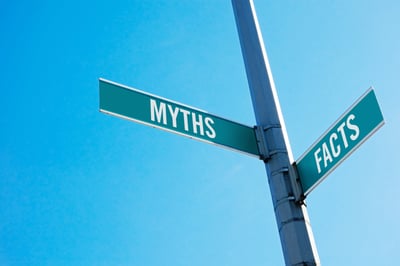
SEO is a crazy industry.
Every day, thousands of marketers spend their time trying to acquire business through a search engine that keeps most of its algorithmic secrets under wraps. It’s natural that this would lead to a huge number of myths around our industry. Sometimes these myths are blatantly false, and other times simply misconstrued or misplaced.
This guide offers a breakdown of why so many SEO myths exist, what some of the most common SEO myths are (and the realities behind them), and how you can actively avoid them in the ever-changing world of SEO.
SEO is full of gray areas—that's just the nature of how SEO works, so misinformation of all sorts spreads easily across the industry. The source of most SEO myths, however, can usually be boiled down to one of these three things.
Sure, they give us search quality evaluator guidelines. Their patents are public on the internet. And Googlers like John Mueller, Gary Illyes, and Danny Sullivan answer a lot of questions for us on Twitter. But there will always be aspects of Google’s inner workings that they don’t share.

With over-speculation comes misinterpretation. It’s really like a big game of telephone. What starts as “links are helpful for ranking” gets passed on and becomes “any link will do,” and eventually we have people shoving links into every blog comment possible and thinking it’s making a big difference for them.
It doesn’t help that everyone and their dog has a blog about SEO. And unfortunately, our industry is young. There aren’t many standards, certifications, or degrees associated with SEO, which opens the door for just about anyone to attempt to write authoritatively on the subject. This only multiplies the misleading information.
Now that you know a little bit about where these myths originate, here are some common myths to watch out for, along with explanations of the realities behind them.
This isn’t something most of us say, but it’s something I think a lot of us subconsciously believe. I can’t tell you how often I ask someone, “What have you done so far in regard to SEO?” and get, “Well I have a Moz subscription” as a response.
Tools help us work effectively and efficiently. They provide data and insight that most of us couldn’t find on our own, and some might solve problems, but creating an SEMRush account doesn’t do a single thing for your site’s ability to rank.
Likewise, obsessing over site audit reports and authority metrics doesn’t move the needle. Not to mention, we probably rely on them a bit too much. Sometimes there’s nothing better than taking a look at a site with nothing more than your eyes and a notepad.
Reality: Invest in SEO software to access data and streamline your processes. But make sure you know what you’re doing with it, and don’t confuse tracking and reporting for optimizing.
Build it and they will come, right?
This is a popular notion that has crept into the SEO sphere over the last two years. At its root is Google’s desire for marketers to do nothing to manipulate their PageRank algorithm.
If you have a big following in your field, you can afford to simply publish great content and do nothing more for SEO. Well-known thought leaders could publish the ABCs and have 10,000 pageviews and 1,000 shares within an hour—no need to build links in order to rank and get it seen.
But for the rest of us, if you build it, they probably won’t come unless you make some effort to get them there.
Well-written articles can pick up some random links and build steam over time, but why leave your website traffic to chance when it’s your job to rank it? You'll need to figure out some other ways to get traffic to your website.
Reality: You should seek to only publish high-value content, but you need to promote and distribute your content to get it seen. Do this with a smart link building strategy and creative campaigns.
This is widely believed, especially in the still-thriving world of paid links. Link buying and selling is a black hat SEO tactic in which some sites offer a link on their high DA domain in exchange for money.
Google can tell when a link has been stuffed into a guest post that has no traffic. The algorithm can also tell when your backlink is hidden within a footer of a spammy site. Value is attributed accordingly.
Google gives us an idea of how they evaluate links through a handful of patents:
Reality: Links vary greatly in value. Be picky when link building—look for links from sites you trust and make sure they’re placed in a way that would make you consider clicking.
I know people still believe this because I get comments on blogs almost every day that look like this:

There’s no real substance to the comment, but there’s always an ask.
The vast majority of blog sections attribute nofollow tags to links found in comments, meaning they pass far less PageRank or link equity, even though they appear in Google Search Console.
Google’s new link attributes now allow webmasters to tag blog comments as user-generated content (UGC). This will give Google an even better idea of what kind of links their algorithm is working with.
Many say that blog comment links are a good tactic to promote content. I think this is true, but let me be the first to tell you that commenting “Nice blog, here’s mine” is probably not going to double your traffic.
Reality: If you use blog commenting as a way to promote content, do it on relevant sites, and try to actually add value to the posts you’re commenting on. Give others a reason to consider clicking on your link.
This is a myth I’ve seen slow down in recent years, but still hear it occasionally. Blogs want to keep people on their site, not send them away by linking to external pages, so they avoid linking to other sites.
The question a lot of SEOs wonder is: “Do outbound links help or hurt SEO?”
Google has been pretty clear that outbound links neither directly hurt nor help rankings. They have also been clear that in general, outbound links are helpful to users. Not to mention, if you make a strong claim, it makes sense to cite something in reference to your claim with a link.
Reality: Outbound links don’t have a direct effect on ranking, and you need to cite your sources. Seek to link to other high-authority and trusted websites and follow Google link guidelines.
This is another myth I hear from clients on a regular basis: “Don’t I need to make regular updates to help my SEO?”
The answer to this is twofold. There’s a lot of evidence that Google values freshness for some topics. For instance, an article on a recent news story published today has a good chance of ranking higher than one published two weeks ago. For other queries, however, old content may be more ideal than new content.
Updating random parts of your website on a regular basis likely does not have a direct effect on your site’s rankings. Updating an old blog post with new and valuable information can help rankings, but generic, just-for-the-sake-of-it updates to your About page are unlikely to help in any way.
Reality: Google values freshness for certain topics. Update old content when applicable, but there’s no need to make unhelpful updates just in case it helps rankings.
Google refers to duplicate content as: “substantive blocks of content within or across domains that either completely match other content or are appreciably similar. Mostly, this is not deceptive in origin.”
It’s a popular myth that Google issues manual action penalties for duplicate content. Many believe this because site audit tools always flag duplicate content where keyword cannibalization occurs.
It’s possible that when two pages appear relevant to the same query, Google may not know which page to display, thus hurting ranking potential or having the less desirable page rank. However, there is definitely no penalty coming from Google.
Googler Susan Moska made it clear in 2008: “Let’s put this to bed once and for all, folks: There’s no such thing as a ‘duplicate content penalty.’ At least, not in the way most people mean when they say that. You can help your fellow webmasters by not perpetuating the myth of duplicate content penalties!”
Reality: It’s possible that there are negative implications for duplicate content, but there is no penalty. You can deal with duplicate content by using the rel=”canonical” tag to specify to search engines which version of a duplicate is preferred.
This myth is perpetuated by a number of things—one is search engine ranking factor studies. For instance, in 2017, SEMRush published a study listing content length as a ranking factor.
The study looked at the ranking pages for 600,000 keywords and determined the factors that top-ranking pages had in common.
This study has value—the fact that high-ranking pages contain more content than low-ranking pages is very telling for us. But it doesn’t mean it’s a Google ranking factor—correlation does not equal causation. A few months ago, John Mueller stated explicitly that word count is not a ranking factor.
Google holds that the length of content should be valued based on the query. Some questions require longer answers while others can be answered briefly. Whether or not their algorithm reflects this may be up in the air, but we can assume that’s what they’d like it to do.
Reality: It does seem that long-form content outranks thinner content, but content length is not a ranking factor. Seek to answer your audience’s questions and satisfy the query for which you want to rank.
When you come across a lofty SEO claim, a good rule of thumb is to look for one of the following to back it up:
|
But as we know, even with one of the above, there may be room for misinterpretation. Here are a few additional caveats:
While there is a lot of harmful content out there that you should be wary of, there are also plenty of resources that can help you navigate misinformation on the web. Educate yourself on proper SEO strategy so you won’t be susceptible to such myths.
Brooks is a Digital Marketing Specialist and SEO Lead at Engenius, a marketing agency in Greenville, SC. When he’s not panicking about ranking drops and algorithm updates, you can find him watching NBA games, eating tacos, or blogging at Creative Primer.
About a decade ago, blogging was becoming mainstream and transforming into a lucrative...
 by Chintan Zalani
by Chintan Zalani
When it comes to marketing, there is a sea of misinformation and noise to wade through.
 by Brittany Bach
by Brittany Bach
Advancing technology and growing competition are in their heyday.
 by Dinesh Varadharajan
by Dinesh Varadharajan
About a decade ago, blogging was becoming mainstream and transforming into a lucrative...
 by Chintan Zalani
by Chintan Zalani
When it comes to marketing, there is a sea of misinformation and noise to wade through.
 by Brittany Bach
by Brittany Bach


